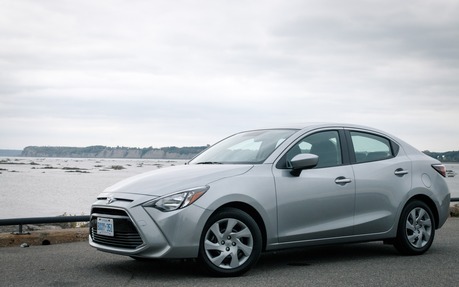2016 Toyota Yaris Sedan: The Adopted Son
I first drove the 2016 Yaris sedan in Toronto last July. I was there to test the Scion iM so that I could write the text about it for the 2016 edition of Le Guide de l’auto, our best-selling French publication.
I tested the Yaris sedan just because I happened to be there and, unfortunately for the Scion iM, the Yaris stole the show. After just a quick spin around the block, I was really impressed with the small sedan. This Yaris is nothing like a Yaris. It doesn’t have anything in common with the hatchback version, because when you peel back the Toyota exterior, it’s actually a Mazda2 sedan—the one that Mazda’s not selling in my home province of Quebec.
I recently had the chance to test the Yaris sedan more extensively, an experience that left me wondering whether my article should actually be called “A Small Mazda3”!
Toyota’s take on Kodo
Mazda gives special names to the various styles that characterize the generations of its vehicles. The current fleet showcases the Kodo design philosophy, which includes crisper lines and a front treatment that looks like a feisty beast.
Hints of Kodo are evident everywhere on this new Yaris/Mazda2, except the front, where Toyota has merged Kodo with its own style. The result is interesting to say the least, but ultimately not as slick as pure Mazda style.
SKYACTIV technology included
If you buy the hatchback Yaris, you’ll get a 1.5-litre four-cylinder engine with 106 horsepower. This engine powers the front wheels by way of a five-speed manual transmission or a four-speed automatic.
But the Mazda vehicle obviously comes with a Mazda engine. This time it’s the smallest SKYACTIV engine available in North America, also a 1.5-litre with 106 horsepower.
The funny thing is that it seems like the sedan’s mill delivers more power. It may have something to do with the transmissions, considering that the Yaris sedan offers the choice of a six-speed manual or six-speed automatic. If you’re wondering which of the two is most effective, let me assure you that they’re essentially the same.
The sedan features SKYACTIV technology, with direct injection and a high compression ratio for the engine, and more speeds for the transmissions. As a result, it’s more fuel-efficient than its non-SKYACTIV sister in the hatchback. In fact, the difference is surprising. Whereas the Yaris hatchback uses approximately 7 L/100 km, the Yaris sedan burns 6.5. But of course, these rates depend a lot on your driving style.
No mistaking the interior
Climb aboard the Yaris sedan and you’d swear it was a Mazda. The level of similarity is almost embarrassing. The infotainment screen and controls are identical, while the steering wheel uses the same fake carbon fibre found in all Kodo vehicles.
Overall, it’s a really nice cabin, so Toyota made the right choice in leaving it untouched. In terms of space, it offers about as much as the competition. If you’re looking for a vehicle to carry four adults, go look somewhere else. There’s no way two grownups can sit comfortably in back.
So responsive it’s sporty
In general, Mazda products are known for being sportier than the category norm. And the good news is that this trend is expected to continue with the Mazda2 hatchback, expected in the near or not-so-near future. And what about the Yaris sedan? Well, since it’s essentially a Mazda2 sedan, it’s handling is sporty too.
For instance, the steering genuinely communicates what’s happening on the road surface and the drivetrain is quick to respond—almost to the point of being aggressive about it. You really feel like you’re driving a small Mazda3.
The only potential catch with this vehicle is its reliability. It still isn’t clear how well SKYACTIV technology will age. Will it fail five years down the road? Who knows, but for the time being, Mazda is offering a warranty with unlimited mileage, a testament to their confidence in their products. And Toyota is confident enough to associate this technology with its name.
If there’s one thing that is strange about this situation, it’s that Toyota is relying on another company to design one of its products. They’re clearly counting on their logo and legendary reliability to sell their cars.
Conclusion: The Yaris sedan is significantly better—and more modern—than the Yaris hatchback. Consumers should consider them completely different models.
Nice job on this sedan!
- Check out our Toyota zone
| Test drive report | |
| Test model | 2016 Toyota Yaris |
|---|---|
| Trim level | Sedan (Auto) |
| Price range | $16,265 – $19,500 |
| Price as tested | 19 500 $ |
| Warranty (basic) | 3 years/60,000 km |
| Warranty (powertrain) | 5 years/100,000 km |
| Fuel economy (city/highway/observed) | 7,1 / 5,6 / 6,5 L/100km |
| Options | N/A |
| Competitive models | Chevrolet Sonic, Ford Fiesta, Honda Fit, Hyundai Accent, Kia Rio, Nissan Versa |
| Strong points |
|
| Weak points |
|
| Editor's rating | |
| Fuel economy | With a combined fuel consumption rate of 6.5L/100 km, it’s hard to ask for more. |
| Comfort | Great for this type of car. |
| Performance | 106 ponies that live up to their full potential, but the competition’s cars are more powerful. |
| Infotainment | Excellent Toyota-Mazda combo system. |
| Driving | Probably the most dynamic sub-compact sedan. |
| Overall | A dynamic, fuel-efficient and attractive sub-compact. |
